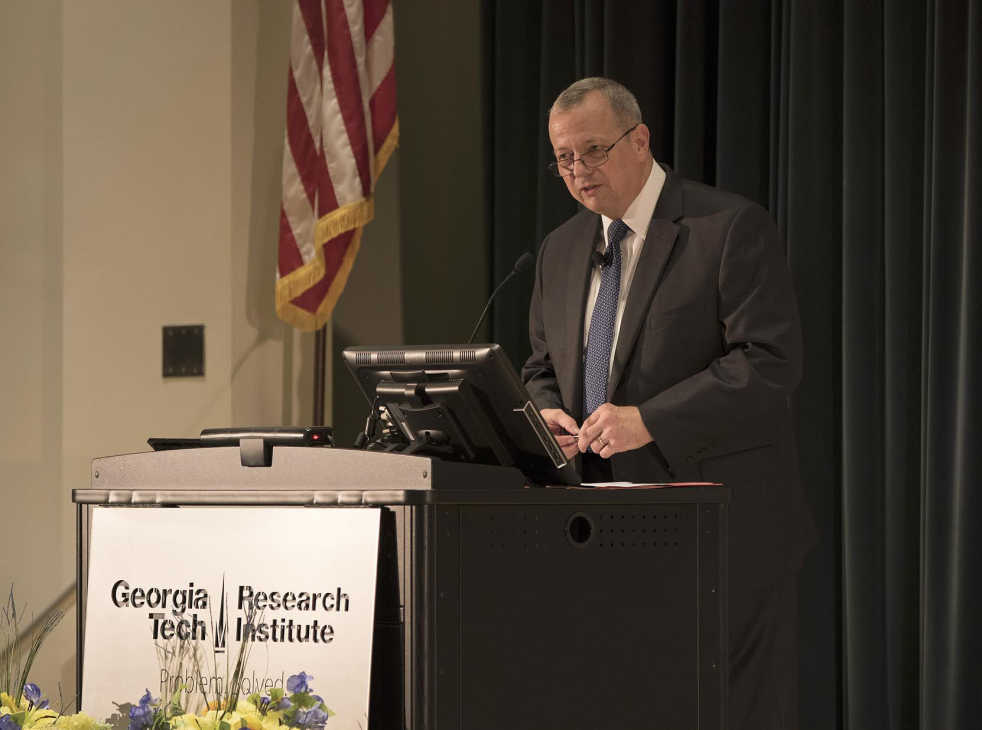Scholars, analysts and military experts gathered at Tech’s Research Institute Conference Center on Sept. 22 for the Sam Nunn Bank of America Policy Forum, which this year addressed the issues of radicalization and ideological extremism.
“We’re in a different era now. The world is a lot more complicated,” Senator Nunn said in a one-on-one interview after the forum. “The public opinion is crucial in terms of encouraging candidates and encouraging people in public office to really understand the complexity of the issues. … So I think the public’s opinion is incredibly important, and, therefore, this forum is enormously important, and probably particularly — although it’s not timed for that purpose — during an election where everybody wants simple solutions, and grandiose promises are totally unrealistic.
“Because there’s so much technology here and so many people who are so bright, and also because the students are so interested — … including Tech and Emory and the University of Georgia and historically black colleges like Morehouse and Spelman — these are the young people who are going to be faced with this problem.
“I can assure you that my generation is not going to be the one to solve [radical extremism]. It’s going to be a problem that’s with us for decades, and having a sound strategy that can be implemented over time and understanding that in the long run, the Muslims have to get rid of extremism in their own ranks. But in the short run, we have to figure out how to protect ourselves and work with our allies and our friends. So all of that’s important, and having it in a public forum is extremely important, and also trying to get rid of an over-simplistic approach to complicated problems. … I’m afraid that we have too much of that going on right now.”
The two panels aimed to address two aspects of the prominence of extremism, with the first addressing the origins of extremism and the second addressing how it can best be combated in its present state.
The first panel was opened by Jon Alterman, Ph.D., senior vice president at the Center for Strategic and International Studies and the current holder of the Brzezinski Chair in Global Security and Geostrategy.
Alterman framed his speech with an opening discussion of giraffes: while there are four species of giraffes, most laypeople generalize them as all being the same. Similarly, radicalized terrorists are put together regardless of their complex organizational structures and differing motivations.
“There is no ‘essential nature’ to terrorism in my judgement or in this kind of terrorism,” Alterman said. “There is no single driver. And I think very importantly, differences we might not be paying attention to provide important opportunities for us to disrupt the way these groups operate.”
The panel continued with a presentation by Mia Bloom, Ph.D., of Georgia State University regarding the use of children in Middle Eastern war zones, particularly in Syria.
According to Bloom, all groups active in Syria use children — even those which are considered U.S. proxies — in roles ranging from propaganda tools to soldiers, assassins and strategic assets on the front lines. The conversation continued with presentations from Hisham Melhem, analyst for Al Arabiya News, and Lorenzo Vidino, Ph.D., director of the Program on Extremism at the George Washington University Center for Cyber and Homeland Security.
The former discussed radicalization as a concept independent of conventional Islam, and the latter analyzed the seeming lack of connection between societal integration and radicalization.
The second panel opened with remarks from Admiral James A. Winnefeld, Jr., USN, former vice chairman of the Joint Chiefs of Staff and current Distinguished Professor at Tech’s Sam Nunn School of International Affairs. Admiral Winnefeld focused largely on radical groups’ appeals to youth culture and the efforts of nations such as the United Arab Emirates to rejuvenate patriotism and redirect vulnerable populations away from radicalization.
The panel then turned to former Ambassador to Yemen Gerald Feierstein; William McCants, Ph.D., fellow with the Center for Middle East Policy and director of the Project on U.S. Relations with the Islamic World at the Brookings Institution; and Dr. Nadia Oweidat, Smith Richardson fellow at New America.
The conversation focused on extremism as a symptom of societal strife and, furthermore, a concept that will never be solved with military strategy alone. Oweidat presented a series of modern cultural artifacts which reinforced or combatted radical notions, including videos designed for children and commercials.
The forum is organized by the Nunn School and made possible by an endowment from the Bank of America, which has partnered with Tech in this endeavor for the past 13 years.
